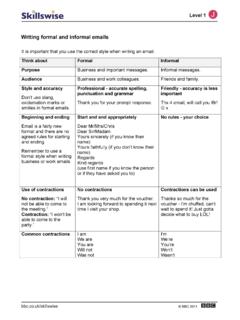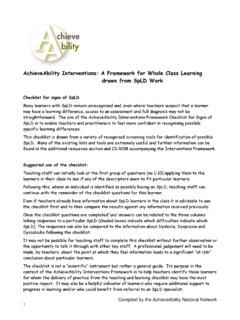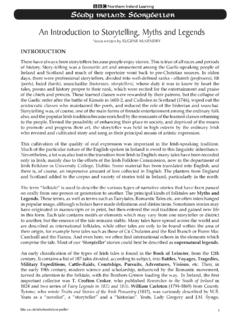Transcription of Instructor will post this information in Week 1 welcome ...
1 National Center for International Studies: Power of One Syllabus Page 1 of 28 National Center of International Studies: Power of One Course Syllabus Power of One: South Africa IS610 3 Credit Hours Summer 2018 Course Introduction Instructor : Instructor will post this information in Week 1 welcome announcement. Office and Hours: Phone: E-mail: Official Course Description: Power of One courses explore psychology within an international context. Applies theoretical, practical, and professional knowledge related to working with diverse populations. This course is designed to provide students an in-depth understanding of South African cultural, educational, and political practices and beliefs.
2 Through exploration of course content and in-country activities, students will gain knowledge and expertise in program evaluation and design that is culturally relevant and appropriate for key stakeholders and target audiences. The study abroad component of this course will include activities in which students will be actively engaged in a diverse variety of in-country experiences focused on South African educational institutions and community organizations. Institutional Learning Goals, Competencies and Outcomes Institutional Learning Goals Please refer to the 2014-2015 Statement of Values for a description of how our Institutional Learning Goals are derived.
3 Diversity A graduate will be able to apply theoretical and practical knowledge about ethnic, racial, gender, sexual, cultural and religious, age, and ability difference in professional work. By the end of this course, students will be able 1. Demonstrate knowledge of the world-view of the local culture within the context of psychology. a. Evaluate how learning theories and technology are perceived and utilized in different contexts. b. Demonstrate the ability to develop and deliver culturally responsive and competent interventions to diverse populations across a variety of settings. c. Develop program design and evaluation while preserving communities, individual, and cultural traditions.
4 2. Analyze differences between host culture and own culture. a. Compare and contrast the cultural, educational, and social differences between the United States and South Africa. b. Interact with others in a respectful, culturally sensitive manner by demonstrating knowledge of individual and group differences. c. Analyze external factors that may impact students academic outcomes. 3. Examine global perspective in relation to their professional and academic goals. a. Integrate ethical and professional codes, standards, and regulations into addressing international situations with cultural competence and sensitivity. National Center for International Studies: Power of One Syllabus Page 2 of 28 4.
5 Explain personal, professional and academic impact of their experience abroad. a. Reflect on personal experiences and how their perceptions how changed throughout the course. b. Describe the importance of developing cultural sensitivity in educational and organizational workplace settings. professional Behavior A graduate will be able to function in a professional and ethical manner in classroom, off-site training, and work settings. By the end of this course, students will be able 5. Recognize value of interacting with individuals with backgrounds and/or perspectives different from their own. a. Discuss changes in cultural, educational, and social perspectives that result from analyzing the course content and in-country activities.
6 B. Reflect on own personal biases of educational practices and use of technology. 6. Demonstrate ability to tolerate ambiguity in complicated environments where clear-cut answers or standard operating procedures are absent. a. Examine global issues and perspectives between the United States and South Africa. b. Explore external factors that impact student learning. 7. Practice responsibility and accountability by making appropriate decisions on behavior and accepting the consequences of their actions. a. Attend all pre-orientation trainings to prepare for travel and in-country activities. b. Engage and actively participate throughout all online class activities to develop an understanding of the South African culture and in-country expectations.
7 C. Actively participate in all in-country activities and events. d. Communicate respectfully and use culturally sensitivity ways with all individuals while in-country. 8. Demonstrate ability to be self-reliant in non-classroom environment. a. Complete all course readings and assignments. b. Engage in hands-on activities that will shape their views of cultural, educational, and social differences between the United States and South Africa. Course Learning Outcomes adapted from & resource for developing MLO: Hovland, K. (2010) Global learning: Aligning student learning outcomes with study abroad. NAFSA: Association of International Educators. Retrieved from: National Center for International Studies: Power of One Syllabus Page 3 of 28 Required and Optional Texts and Electronic Reserves Required Texts: There are no required textbooks for this course.
8 EReserve Readings Chinyamurindi, W. & Herring, S. (2015). An investigation into e-learning acceptance and gender amongst final year students. South African Journal of information Management, 17(1), 1-9. Cluver, L., Orkin, F., Meinch, F., Boyes, M., & Sherr, L. (2016). Structural drivers and social protection: Mechanisms of HIV risk and HIV prevention for South African adolescents. Journal of International AIDS Society, 19(1), 1-9. Elusfisan, K. (2014). Impediments to the successful reconstruction of African immigrant teachers professional identities in South African schools. South African Journal of Education, 34(2), 1-20. Gibson, & Classen, C.
9 , (2010). Racial Reconciliation in South Africa: Interracial contact and changes over time. Journal of Social issues 66(2), 255-272. Retrieved from Govender, K., Reardon, C., Quinlan, T., & George, G. (2014). Children s psychosocial wellbeing in the context of HIV/AIDS and poverty: A comparative investigation of orphaned and non-orphaned children living in South Africa. BMC Public Health, 14. Retrieved from Hviid, P., Villadsen, (2013). Cultural identities and their relevance to school practice. In Culture & Psychology 2014. Vol. 20(1) 59-69. Koocher, (2009). Ethics and the invisible psychologist. Psychological Services, 6(2), 97-107.
10 Leibowitz, B., Bozalek, V., Schalkwyk, S., & Winber, C. (2014). Institutional context matters: The professional development of academics as teachers in South African higher education. Higher Education, 69(2), 315-330. Liebenberg, H., Chetty, Y., & Prinsloo, P. (2012). Student access to and skills in using technology in an open and distance learning context. International Review of Research in Open and Distance Learning, 13(4), 250-268. Matsumoto, D. & Juang, L. (2008). Culture & psychology (4th ed). pp. 1-57. Belmont, CA: Wadsworth. Mettetal, G. (2012). The what, why and how of classroom action research. Journal of the Scholarship of Teaching and Learning, 2(1), 6-13.




